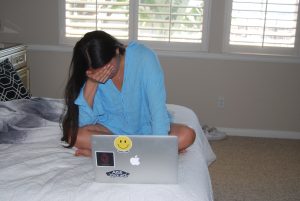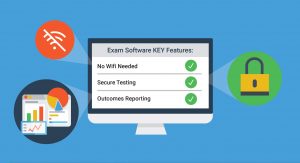
With eyes lasered to the screen and sweat dripping at the sides of her face, Lauren Mochizuki, Public Relations and Advertising major, anxiously takes her proctored exam.
Since transitioning to an online learning platform, many professors have used Chapman-approved resources to keep their students honest and studying. This means some students are required to download virtually proctored testing software that follows their every move.
This comes with a new set of challenges.
Here’s how it works: Testing programs prohibit the use of external tabs opening during an exam to discourage students from opening alternative notes while taking an online test. Some programs even examine the background of the students testing area to confirm that notes and extra help is not in sight. Typically, if another tab is open testing software automatically shuts down and sends a report to the person administering the exam.
According to Lawrence Brown, vice provost for academic administration, faculty use Examsoft, or some may create their exam using Qualtrics. As for proctoring, Respondus Lockdown browser and Proctorio Monitor are used to ensure students academic honesty.

Professors understand that this format may create some stress among students, however, Brown states that it is similar to the professors watching students during exams in person.
“Technically remote proctoring shouldn’t induce any more pressure or anxiety than the proctoring that is done during exams in the classroom, he said.
Similarly, Brown explains that this is the only way to continue testing, since the pandemic has shifted classes online.
“The benefit is that students are able to demonstrate their knowledge of the subject in a standardized and objective manner,” he said.
Nonetheless, students are often uncomfortable with the thought of people watching their every move on camera. What if your roommate breaks a glass in the other room? Can’t move. What if someone rings the doorbell? Can’t flinch.

Mochizuki explains how she tends to feel engulfed in the thoughts about the testing format, rather than the course material itself.
“Sometimes I get really anxious during tests where I have to keep my camera on because I hate feeling like someone’s watching me,” she said.
While some professors have recognized that this adds another layer of stress, multiple professors have opted to give alternative assignments to lessen the anxiety that students feel while taking a test with such pressure.
Professors have taken the liberty to allow students to use their notes and other tools for their exams to eliminate the test anxiety that is often intertwined within proctored exams.
Even though this has made taking and studying for tests easier this year, students are timid about exams when they return to in-person instruction in the future.
Junior communications major, Dylan Tingz, expresses how he is looking forward to in-person instruction, despite being out of practice cramming for exams.
“I am nervous for in-person exams because over zoom learning, professors have become accustomed to allowing students to use tools such as textbooks, notes, and a variety of other sources to take tests,” he said.

In addition, Tingz describes the ways that virtual testing lacks the sense of application that is often molded into in-person learning curriculums.
“While I am nervous, I also am eager to get back into the classroom & force myself to study and apply myself towards exams. The in-person format keeps myself accountable in every regard and I find that’s where I get the most out of my schooling,” he said.
Similarly, Johanna Bos, junior communications major, describes online testing to be nerve racking due to the possibilities of technical difficulties.
“I am always nervous that my computer is going to crash in the middle of an exam,” she said.
Jarett Grolman, junior psychology major, is reluctant to return to in-person testing due to the amount of flexibility professors have given students during this time.
“I’ve found this to be very refreshing and have enjoyed the flexibility that professors have given us during this period. Therefore going back to the in person, often more stressful, classroom setting is definitely not something I can say I’m looking forward to,” he said.
Moving forward, many students are eager to be back in the classroom so that they can ask their professors for clarification when deemed necessary. Students explain that there’s a strong communication barrier within an online learning platform that has students craving immediate guidance prior to exams.

Lauren Wong, health science major, expresses her anticipation for face-to-face learning in regards to various testing formats.
“Being back in person will be better for my education and I’m ready for it,” she said.
With finals approaching and in-person instruction in encroaching, most students are fed up with virtually proctored exams and strict testing formats.
Fingers are crossed that students will only have to endure the challenges engrained within these formats for just a short period of time.

